Summary
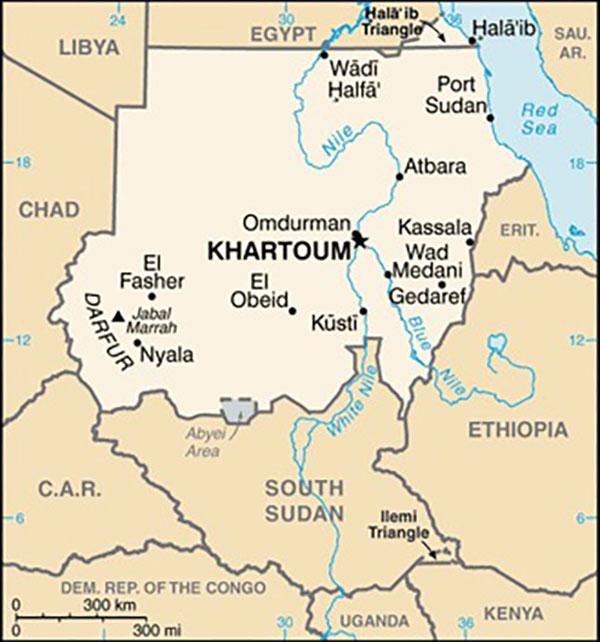
Map of Sudan
Sudan, on the east coast of Africa facing the Red Sea, borders seven countries (see map). Since gaining independence in 1956, Sudan has experienced numerous civil wars and been governed mostly by military dictatorships.
A recent movement to bring democracy to Sudan was ended by a new civil war. Massive protests in 2019 led to the overthrow of Omar al-Bashir, the long-time dictator. But military factions prevented a stable transition to civilian rule. In April 2023, two rival generals took up armed conflict to determine control over the country. The result has been widespread death, displacement and famine (see Current Issues).
Prior to 2019, General al-Bashir had ruled Sudan as president for 30 years with absolute control over political, military, economic and religious institutions. For decades, the Arab-dominated government tried to impose “Islamic order” on the country, a policy that triggered civil wars with the largely animist and Christian south. A 2005 peace agreement ended the main north-south civil war and resulted in the establishment of a separate country, South Sudan, in 2011.
Beginning in 2004, the al-Bashir government directed violent attacks against Black Muslims and animists in Darfur, a western region. Over several years, 450,000 persons were killed and 2.5 million more were displaced. In 2009-10, the International Criminal Court indicted President al-Bashir and others for crimes against humanity and genocide. Al-Bashir, imprisoned in Sudan after conviction on charges of state theft, remains outside ICC custody.
Since gaining independence in 1956, Sudan has experienced numerous civil wars and been governed mostly by military dictatorships.
Sudan is the second largest country on the African continent (1.9 million square kms.) and its population is 50 million (30th largest in the world). Sudan has Africa's most diverse population (70 languages and 600 ethnic groups) but generally 70 percent of the population is Arab and 30 percent Black African. Most Sudanese are Sunni Muslim but 5 percent are animist or Christian belief. According to the International Monetary Fund, nominal Gross Domestic Product (GDP) for 2024 is projected to fall to $27 billion (112th in the world, down from 68th in 2014). GDP per capita income is projected to be $571 for 2024, among the lowest in the world.
History
Early History
Human habitation dates to 40,000 BCE. Competing groups contested for territory with the earliest known recorded war occurring on Sudanese territory in 11,000 BCE. Known in ancient history as Nubia, much of present-day Sudan was ruled by three Kushite kingdoms from 2500 BCE to 300 CE. Influenced by Pharaonic Egypt to its north, the Kushite kings built the Nubian pyramids and, for a time, even conquered Egypt.
After the demise of the last Kushite kingdom in 300 CE, three distinct Christian kingdoms developed along different lengths of the Nile, even as much of the population retained indigenous animist beliefs. Attempts to spread Islam in the seventh century CE were resisted at first, but Arab colonization over centuries made Sunni Islam the dominant religion in Sudan's north.

An 1826 drawing of the Nubian pyramids by Frédéric Caillaud. Public Domain.
Christian Nubia in the south maintained its independence until the 13th century, but northern rule spread across the region. In the 16th century, northern Nubia was claimed by Egypt and incorporated into the Ottoman Empire. Southern Nubia divided into various sultanates and tribal kingdoms that formed a loose confederation. Sultans who ruled the western Darfur region made it a center of the slave trade in the Arab world.
Egyptian and British Rule
In 1820–21, northern Sudan, which had re-established its own rule, was reconquered by the Ottoman Empire during the Muhammad Ali dynasty. Ali established bases to expand the slave trade to the southern and western regions. After the British Empire occupied Egypt in 1882 as a de facto protectorate, British governors sought to expand control over Sudan. It was during this time that Sudan developed its current borders.
An insurrection arose against British-Egyptian governance led by the Arab messianic leader, Muhammad ibn Abdallah. He was known as the Mahdi or "the expected one." Abdallah occupied Khartoum, the northern regional capital, in 1885 and established a republic based on Islamic law. The Mahdi state collapsed in 1898 after a joint British-Egyptian campaign retook Khartoum, but its influence was lasting (see below). By 1899, all of Sudan was under joint British-Egyptian authority.
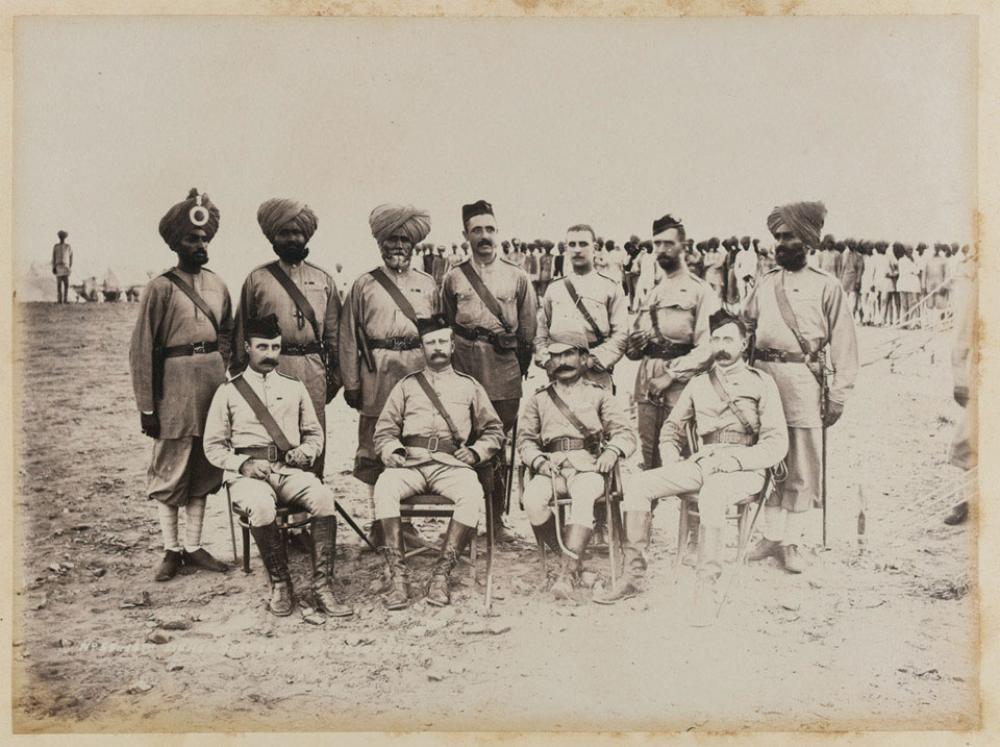
A photo of British officers with the Bengali Native Infantry during the first Sudan War with the forces of the Mahdi (1884). Public Domain.
In the 1920s, the British governor again separated the north and south when he instituted different official languages and imposed internal passport controls for travel between the two regions.
Independence and Civil War
During World War II, the Sudan Defense Force fought with the Allies against the Axis powers. After the war, the British initiated a self-government process for Sudan designed to end colonial rule. Independence was declared in 1956 with Khartoum as the capital.
During World War II, the Sudan Defense Force fought with the Allies against the Axis powers. After the war, the British initiated a self-government process designed to end colonial rule. Independence was declared in 1956.
The British had always favored the government in the mostly Arab north, where its colonial administration had been concentrated. As a result, the Arab north dominated the country’s institutions upon independence. But a group of southern army officers rebelled against the northern authorities and waged an armed struggle against the government. A peace agreement in 1972 brought a ten-year period of peace.
Gaafar Nimeiry, a former army officer in power since 1969, suspended autonomy in the south in 1982, declared Sudan an Islamic state and imposed Sharia (Islamic) law over the whole country (similarly to the Mahdi). Nimeiry was overthrown in 1985 and a moderate Islamic party gained power, but his stifling policies remained in place. Unification efforts ended. The Sudanese People's Liberation Army (SPLA) resumed a southern rebellion.
Omar al-Bashir Consolidates Power
After a brief period of civilian rule, Lieutenant General Omar al-Bashir seized power in 1989. He ruled Sudan for the next thirty years. During the first ten, he governed as president in a joint military-civilian regime in alliance with the Islamist leader Hassan al-Turabi. When Turabi, who had allied with the international terrorist group al Qaeda, challenged the dominant position of al-Bashir, he had Turabi removed as leader of al-Bashir’s National Congress Party (NCP). Turabi was then arrested in 1999.
After a brief period of civilian rule, Lieutenant General Omar Hassan Ahmad al-Bashir seized power in 1989. He ruled Sudan for the next thirty years.
Now as the country’s undisputed leader, al-Bashir organized patently unfree elections in 2000. The NCP claimed most of the 340 seats in the National Legislature. Opposition parties were barred from campaigning.
Throughout this period, the national government carried out a ruthless military campaign against the SPLA rebellion in the south. Both sides were accused of violating the rules of war, but the government engaged in greater atrocities, including scorched earth policies resulting in famine and widespread displacement of the population.
The Comprehensive Peace Agreement
In the early 2000s, Omar al-Bashir attempted to restore relations with Western countries. Also, acknowledging that the long civil war had resulted in a stalemate, al-Bashir agreed to a United States-led peace process.
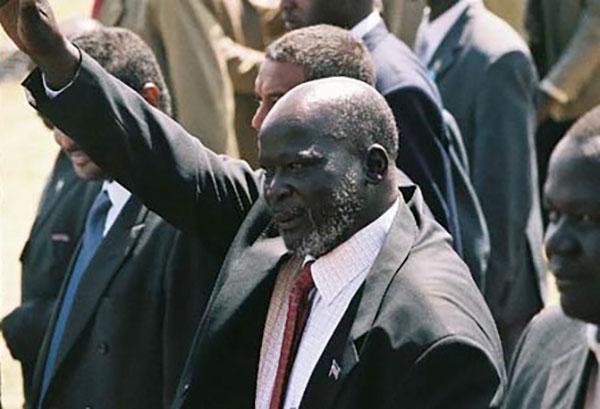
John Garang, a leader of the Sudanese People’s Liberation Army, signed the Comprehensive Peace Agreement in 2005 and favored national unity. He was killed in a helicopter crash soon afterwards. Public Domain.
In 2005, the government signed a Comprehensive Peace Agreement with the SPLA and its political arm. A joint National Unity Government was established with al-Bashir as president and the leader of the SPLA, John Garang, serving as vice-president. Garang favored national unity, but was killed in a helicopter crash soon after taking office. He was replaced by Salva Kiir, the SPLA’s deputy leader, who favored independence for south Sudan.
Terms of the CPA provided autonomy for the southern region and called for a referendum on independence to be held in 2011. By then, any hope for a unified country had vanished. Ninety-nine percent of voters in the autonomous region voted for an independent South Sudan.
The Genocide in Darfur
Even as al-Bashir’s government took part in international negotiations to resolve the war in the south, it was directing a ruthless campaign of mass murder and dislocation in the western Darfur region. The perpetrators were not regular army units but a government-backed Arab militia called the Janjaweed. The Arab militia raided black African Darfurian villages, killing teen-age and adult males and raping women of child-bearing age. Between 400,000 and 450,000 people were killed. At least 2.5 million others were displaced, many to refugee camps in neighboring Chad.
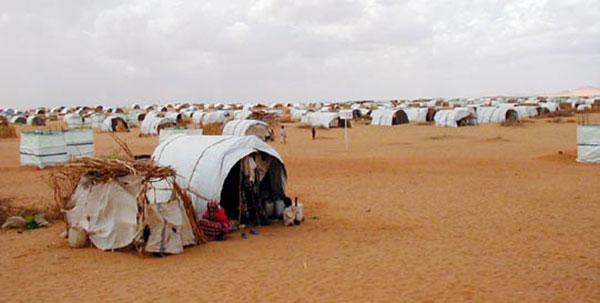
In Sudan, a government-sponsored genocide in Darfur killed around 450,000 people and displaced 2.5 million others. A picture of a mass refugee camp of 40,000 in Chad in 2004, where “disease and despair were rampant” according to a US Congressional report. Public Domain.
The United Nations repeatedly condemned the Sudanese government for war practices in the south and in Darfur, but Russia and China vetoed a formal determination of genocide in the UN Security Council. The issue was referred to the International Criminal Court (ICC). Upon investigation, the ICC indicted President Omar al-Bashir in 2009 for crimes against humanity and issued its first arrest warrant of a sitting leader of government. The crime of genocide was added to the indictment in 2010. Defense Minister Abdelrahim Mohammed Hussein was issued a warrant on both charges in 2012.
Along with other governments, the United States declared the actions of the Sudanese government in Darfur to be genocide in 2004, but no consequences attended the declaration due to the US-led efforts to end the north-south conflict. A UN- and US-sponsored agreement in 2006 was signed by Sudan’s government and one rebel group in Darfur, but other rebel groups did not accept it.
A more detailed description of Sudan’s lack of majority rule and minority rights and descriptions of the 2019 movement for democracy and its aftermath is described below and in Current Issues.
Majority Rule, Minority Rights
Sudan has never experienced genuine democracy where majority rule and minority rights are respected. Through coup d’états, military officers have exercised political power for most of the country’s history since 1956. There were only brief periods of civilian rule and minimal periods of peace among Sudan’s highly diverse population.
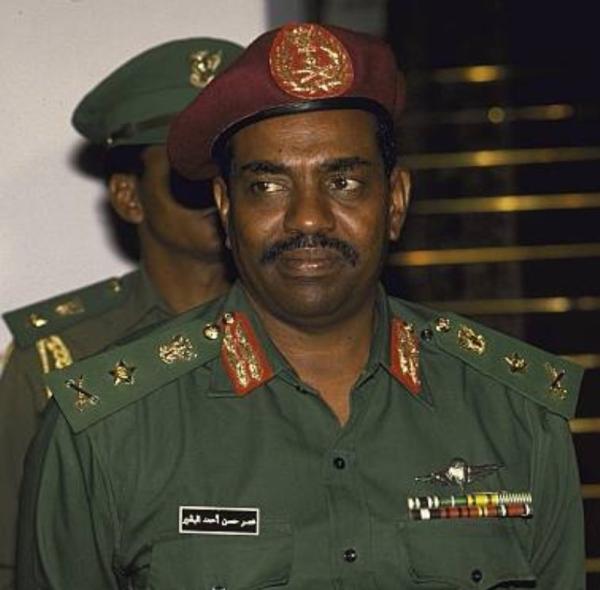
General Omar al-Bashir, in 1990, was Sudan’s dictator for 30 years until being overthrown in a coup in 2019 that followed a months-long campaign of mass protest. Public Domain.
Before independence, the Arab Muslim majority population in the north dominated much of the country’s political, economic and social life under British administration. Since independence, that dominance continued and the country’s authoritarian leaders severely repressed both political opposition and ethnic and religious minority groups. This led to repeated rebellions. In suppressing these rebellions, the government engaged in war crimes, crimes against humanity and genocide.
General Omar al-Bashir was Sudan’s dominant leader for 30 years after overthrowing a civilian government in a military coup in 1989. He gained full control in 1999 by removing his main political competitor. Al-Bashir’s rule was marked by brutal use of military force against rebellions and severe repression of political dissent. His continuation of “Islamic Order” imposed strict Sharia law on the entire country, propelling rebellions in the south. Under terms of a peace agreement, South Sudan separated as an independent country in 2011, but rebellions against al-Bashir’s rule continued in a western region, Darfur, and in the Two Areas of South Kordofan and Blue Nile in the south.
Large civilian demonstrations in the capital Khartoum led to al-Bashir’s ouster by military coup in April 2019. Further demonstrations calling for full democracy brought about a constitutional arrangement for shared military-civilian governance.
Large civilian demonstrations in the capital Khartoum beginning in late 2018 led to al-Bashir’s ouster by military coup in April 2019. Further demonstrations calling for full democracy brought about a constitutional arrangement for shared military-civilian governance that was supposed to lead to free elections. The military, however, carried out another coup against the civilian transition government in late 2021. Civilian protests resumed leading to another power-sharing agreement at the end of 2022. But the agreement excluded many opposition forces and failed to satisfy protesters’ demands.
In April 2023, the two military leaders on whom Omar al-Bashir had relied during his later rule but who then orchestrated his ouster, would not agree to cede power. Instead, the chief of staff of the Sudanese Armed Forces (SAF) and the head of the paramilitary Rapid Support Forces (RSF) themselves began a civil war to achieve dominance (see below and Current Issues).
Political Resistance & Political Repression
For many years prior to the 2019 revolution that ousted Omar al-Bashir, civil society groups in Sudan had organized and begun to strengthen in opposition to the regime. There were regular protests over the years, including to protest repression in Darfur. They were usually dispersed by force.
For many years prior to the 2019 revolution that ousted Omar al-Bashir, civil society groups in Sudan had organized and begun to strengthen in opposition to the regime.
The New Dawn Charter, signed in January 2013, for the first time joined political parties in exile with in-country civic and youth groups and the Sudanese Revolutionary Front, a coalition of the political arms of rebel forces. The Charter proposed a constitutional framework for negotiations with the government (see link in Resources).
Negotiations were scuttled by the government. Instead, al-Bashir held a controlled election in April 2015 for a new five-year presidential term. By official count, he received 94 percent of the vote in a low-turnout election. His National Congress Party claimed three-quarters of seats in the National Assembly. A pretense was made to form a “coalition government” but al-Bashir disbanded it within a year. Political, ethnic and religious repression continued. The Sudanese Professionals Association, the main civic opposition, and other groups had to organize clandestinely.
Darfur & Armed Resistance
A United Nations initiative in February 2013 brought some hope of an accord in western Darfur when two rebel groups signed a peace accord. But al-Bashir violated it immediately when non-participants in the agreement continued attacks. He then reactivated the Janjaweed militias as a paramilitary group called the Rapid Support Forces (RSF). Under the formal command of the National Intelligence and Security Service (NISS), it was headed by Muhamed Hamdan, also known as Hemedti. In 2014 alone, the RSF forcibly displaced 500,000 people in the western regions.
In 2016, the government came to another peace agreement with two of Darfur’s three main rebel groups and the Sudan People’s Liberation Movement-North (SPLM-North), the main rebel group in the Two Areas of South Kordofan and Blue Nile. The agreement was suspended after the government used chemical weapons against civilians.
International pressure on the Sudan government was mostly ineffective and International Criminal Court appeals to honor its international warrants were ignored by countries where Omar al-Bashir travelled.
A Popular Revolution Leads to Change
After years of local civic organizing, popular protests erupted in December 2018 as fuel prices spiked. These evolved into pro-democracy demonstrations against government misrule that continued over months, with women demanding equal rights playing the most prominent role. The demonstrations were organized by the Sudan Professionals Association (SPA), a union of 21 professional organizations, women’s groups, and other civic and political organizations. They joined together in the Forces for Freedom and Change (FCC) to press for democratic change.
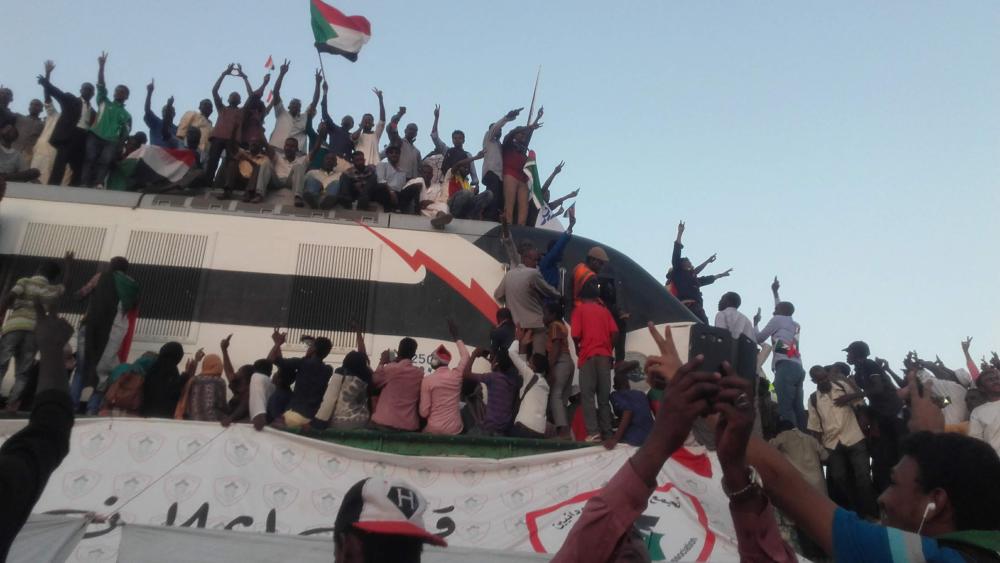
Pro-democracy demonstrations starting in December 2018 led to the overthrow of Omar al-Bashir in April 2019 and formation of a Temporary Sovereignty Council for joint military-civilian governance in July. Creative Commons License. Photo by Esam Idris.
On April 19, 2019, in response to the instability caused by the ongoing protests, the head of the army, General Abdel Fattah al-Burhan, supported by Hamdan’s Rapid Support Forces (RSF), overthrew Omar al-Bashir in a coup.
A Transitional Military Commission (TMC) was formed and attempted to rule without civilian support. Protests continued. A massacre committed by the Rapid Support Forces (RSF) in June 2019 brought a strong international response and led to negotiations by the TMC with the FCC. An agreement was reached to establish a new Temporary Sovereignty Council for joint military-civilian governance. Abdel Ramouk, a respected UN administrator, was named to lead a technocratic government.
In December 2019, Omar al-Bashir was sentenced to two years’ imprisonment on corruption charges stemming from the confiscation of large amounts of cash found in his home following his arrest. Civic and political groups criticized the government for not charging al-Bashir with more serious human rights crimes and for delaying his transfer to the Hague to serve trial at the International Criminal Court.
In October 2020, the Juba Agreement was signed with the Sudan Revolutionary Front (SRF) that incorporated all major Darfurian and southern rebel groups. The SRF’s representatives were added to the Temporary Sovereignty Council and the military agreed to the integration of rebel forces.
A description of continuing events is below.
Current Issues
The Temporary Sovereignty Council established in 2019 ended Omar al-Bashir’s “Islamic Order,” guaranteed basic freedoms, and began a process to end regional conflicts culminating in the Juba Agreement (see above). But a military takeover and civil war between armed factions has ended hope among Sudanese for achieving majority rule with minority rights soon.
The Temporary Sovereignty Council established in 2019 ended “Islamic Order,” guaranteed basic freedoms and began a process to end regional conflicts. . . . But a military takeover and civil war between armed factions has ended hope among Sudanese for achieving majority rule with minority rights soon.
Initially, the interim technocratic government led by Abdul Ramouk that took office in 2019 carried out some basic reforms. The National Political Congress and its web of related political and social instruments of control were dismantled.
Yet, civic and political groups criticized the slow pace of change and the continued dominance of the military and security forces in public life. Ongoing peaceful protests in Khartoum, the capital, and elsewhere were repressed by the Rapid Support Forces (RSF), which also continued its violence in Darfur. Independent media outlets were shut down.
The Juba Agreement with rebel organizations (see above) stipulated that all five persons charged for crimes against humanity and genocide in Darfur be transferred to the International Criminal Court. The head of the Sovereignty Council, however, refused to do so. One person, Ali Kushayb, the leader of the Janjaweed during 2003-2006 when most atrocities took place in Darfur, was arrested while in the Central African Republic and transferred to the ICC.
In October 2021, as the date approached for civilian control under the transitional agreement, Gen. Abdel Fattah al-Burhan, the head of the armed forces, arrested the prime minister and other civilian leaders in another coup. The transition to democracy was ended.
In response to international pressure and large, ongoing civilian protests ─ again with women playing the most prominent role ─ General al-Burhan agreed one month later to release those imprisoned and restore Abdul Ramouk as prime minister. But the Forces for Freedom and Change (FCC), the coalition of civic and political organizations, was excluded from the new Sovereignty Council. Ramouk resigned in January 2022 as large protests continued and bloodshed mounted. (At least 53 demonstrators were killed by security forces after the prime minister’s return.)
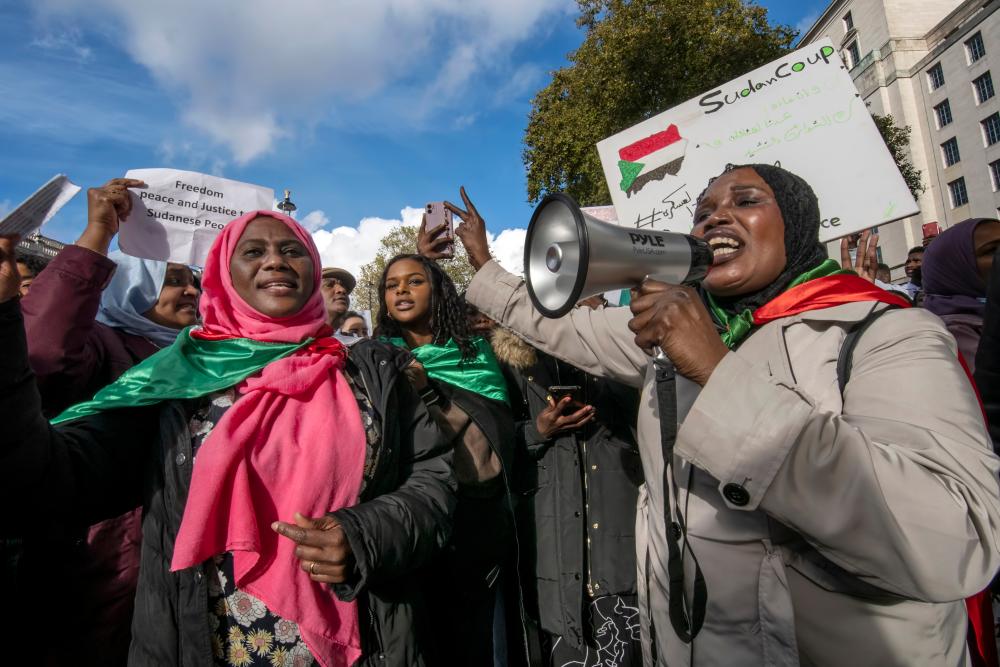
Sudanese civilian resistance to the military coup was ongoing, forcing a temporary agreement, but failed to establish a permanent civilian government. Supporters of pro-democracy forces protest in London after the coup in October 2021. Shutterstock 2067028238 Credit: Koca Vehbi
General al-Burhan continued the Sudan government’s previous alliance with Russia and China. He travelled to Moscow following Russia’s invasion of Ukraine in February 2022 to signal his support. But the Russia Federation dealt with both sides. Russia’s notorious Wagner Group, a paramilitary organization directed by the government, opened a gold-mine in cooperation with Muhamed Hamdan’s RSF so Russia could evade sanctions and enhance gold reserves. The RSF would later use the Wagner Group in Sudan’s ongoing power struggle (see below).
Violence resumed in rebellious regions and there continued to be sustained repression against civic activists, journalists, trade unionists and protesters in Khartoum and other major cities. In response to the regime’s violence, Sudanese civil society began organizing in more diffuse ways through neighborhood resistance committees (see Resources). More than 50 of these committees signed a joint protocol calling for the resignation of military leaders and a new transitional constitution and legislative council.
The international community withdrew financial support to press the military leaders to negotiate with the civic resistance and the regime came to a new agreement with the FFC and several other political parties in December 2022. Brokered by Western diplomats, the agreement again stipulated a transition to a new constitution, commitment to a multi-ethnic society and a timetable for free elections. The resistance committees, however, did not recognize the agreement on the grounds there were no safeguards to prevent another coup. They criticized Western governments for appeasing the military leaders and demanded a full transfer of political power to a civilian government.
The civic opposition proved correct. As the military-led council was scheduled to cede power to a civilian government, the RSF leader, General Hamdan refused the demand for a rapid timetable to integrate his paramilitary forces into the Sudanese Armed Forces (SAF). In mid-April 2023, the RSF began engaging the SAF in ongoing civil warfare with attacks on military facilities, government buildings and civilian centers. A full-scale civil war ensued. There was large internal and external displacement from population centers. Resumed war in Darfur and other regions resulted in increasing atrocities and displacement.
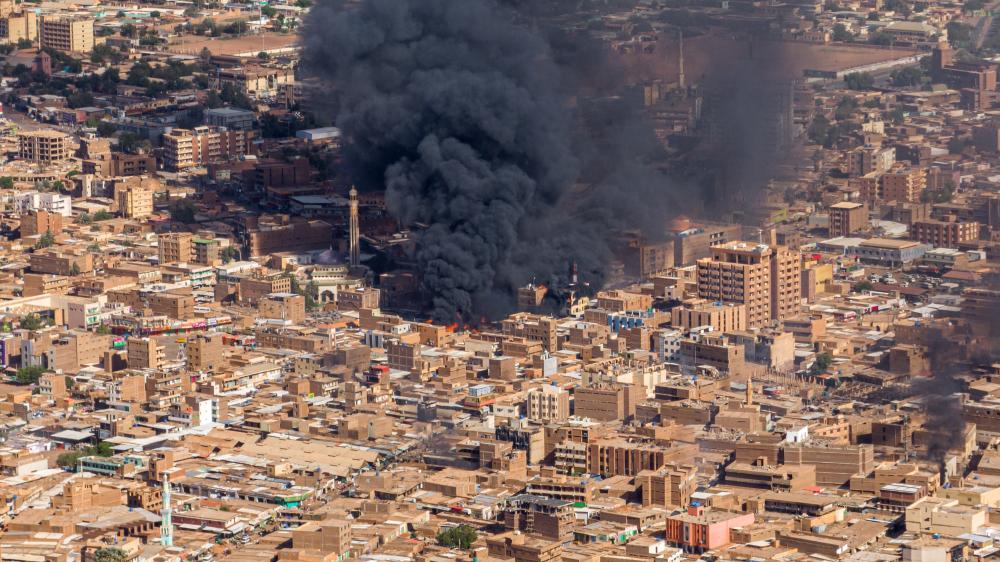
In April 2023, rival military leaders began a civil war instead of ceding power to a civilian government. A fire in the center of Khartoum resulting from the fighting. Shutterstock. Photo by Abd Almohimen Sayed.
Different Middle Eastern countries have continued to support both sides in the conflict. As of January 2025, all ceasefires had been broken and violent conflict has continued. While the RSF gained control of much of Khartoum, neither the RSF nor SAF are in control of Sudan. Efforts led by the UN and the United States to negotiate an end to the fighting have not succeeded.
According to the Armed Conflict Location and Event Data Project, more than 18,760 people were killed after more than a year of fighting. Many more have been injured. (Officials at the United Nations report an even higher toll.) The UN reports more than 8.6 million people have been displaced, including 2 million forced to flee Darfur to Chad. In its estimate, as of late 2024, more than 48 million people faced “catastrophic levels of hunger,” the largest current famine in the world (see The New York Times and New York Times Magazine articles in Resources).
The content on this page was last updated on .
